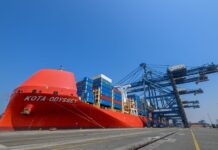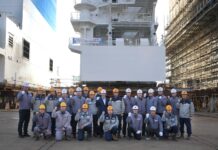
Diving freight rates have inevitably led to plummeting carrier Q3 returns and the outlook for the full year is bleak while next year’s expectations have sunk well below the waterline.
Volatility in carrier earnings is a concern with Alphaliner reporting that Q3 carrier returns had diminished to 1.5%, well below the 2019 average of 2.4% and with pre-Covid margins averaging -0.2% in the ten years before 2020 the carriers could be staring at a prolonged period of losses.
In the immediate future Alphaliner reports are not encouraging: “Based on full-year earnings forecasts, several currently profitable carriers have now confirmed the potential for deficits in the fourth quarter.”
Such is the volatility in the market Q4 forecasts are often broad, unfocused affairs, with Maersk, for example, predicting anything from a US$970 million loss to US$530 million gain. Similarly, Hapag-Lloyd expects anything from US$600 million loss to US$400 million gain. ZIM, on the other hand, is following its impairment test which saw a more than US$2 billion loss, expecting losses of up to US$226 million to continue into the final three months of the year.
According to consultant Jon Monroe: “Carrier executives are already sounding the alarm in third quarter earnings reports that 2024 might be a bloodbath.”
Avoiding any such atrocities will require carriers to manage capacity and cut costs substantially.
In ZIM’s case, that has meant ordering bigger more efficient ships, but demand is forecast, by most observers, to stay at around half of capacity growth until 2027. The Israeli carrier, however, is expecting, or hoping, that the market will turn by the end of 2024.
Eli Glickman, president and CEO of ZIM, said, “We are currently in a transition period, which we expect will extend into 2024, during which we should gradually see the benefits of the decisive actions we have taken to enhance ZIM’s commercial and operational resilience.”
Those actions include a major rebuilding programme, 46 ships in total, almost all of which will be delivered by the end of next year, replacing less efficient vessels that will go off-hire during 2024.
However, the larger ships will increase capacity substantially as well as cut costs. Lower costs, as executive vice president and chief financial officer at ZIM Xavier Destriau conceded, will only be realised if the new vessels can be filled.
“The cost of operating a 15,000 TEU LNG ship is the same as operating a 10,000 TEU ship, so for the same cost, we have a 50% increase in the potential intake in this service. So, providing we fill these ships we get the benefits of the lower costs,” Destriau told Container News.
Monroe believes, “What happens in 2024 may be dependent upon the success of retail sales and BCOs destocking efforts. Expect retailers to be cautious about their ordering until they get a grip on their holiday sales performance.”
However, he concedes that the outlook is poor, quoting a recent Nielsen survey, which reported that 57% of consumers are hesitant to increase their spending this holiday season, and around 84% of global consumers are planning to reduce their spending.
Mary Ann Evans
Correspondent at Large





